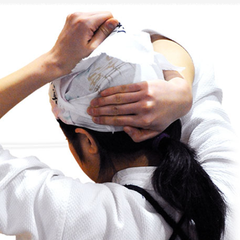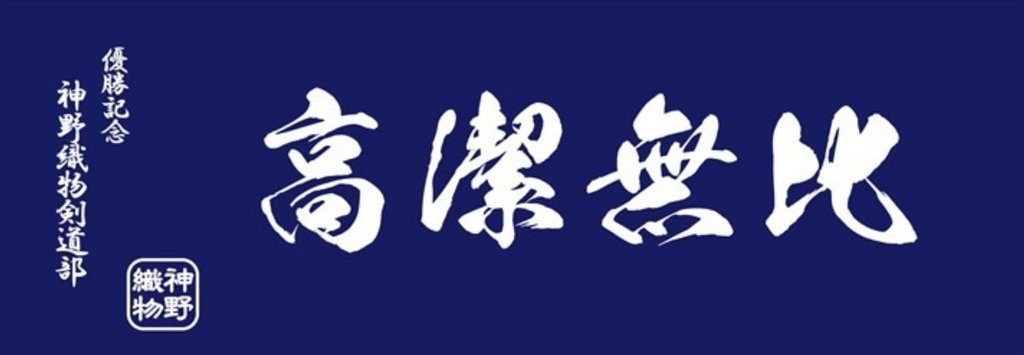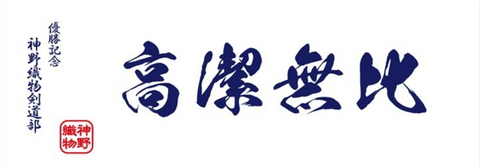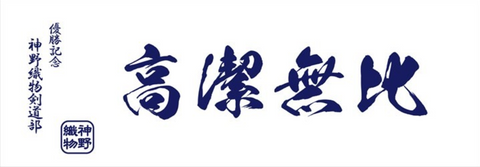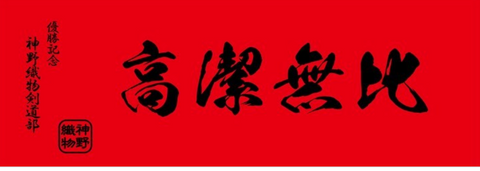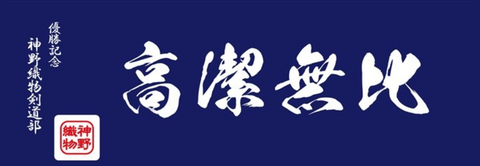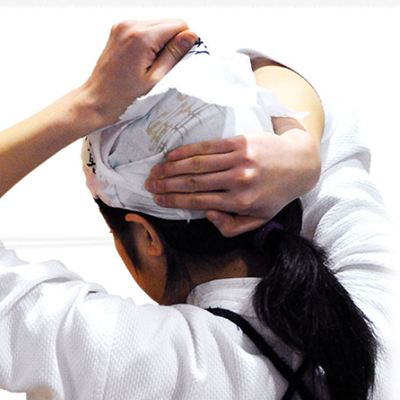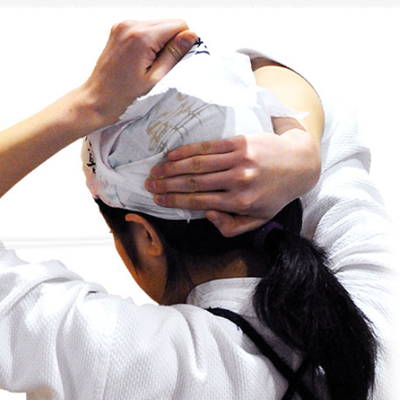Japanese Kendo Custom Order Tenugui "white characters on asolid dyed background"
¥2,030
Availability: In stock
Brand: kannojapan.com
This can be created with the original design of the kendo hall or kendo society.
Please contact us by e-mail for design and consultation on production.
E-mail address:info@e-kanno.com
When sending an e-mail, please enter the subject line "Custom order Tenugui Inquiry".
Japanese Kendo Tenugui
100 cm size for kendo use
Hand-dyed in Japan
Order accepted from 30 pcs upwards!
Since the time of Kanno Orimono’s founding in 1899, many things have changed dramatically. Amidst those changes, we too have come to produce a variety of different items with flat fabrics; including towels, bandanas, wristbands, microfiber towels and bathmats. But one thing that we have continued to produce since the time of our initial founding is tenugui: the cloth head towels that kendo practitioners tie around their heads before donning their protective helmshelmets (or men). We have grown with tenugui. In the world of kendo, tenugui (also referred to as men-shita or men towels) have been used since long ago.


Kendo practitioners (or “kenshi”) tie tenugui around their heads. The act of tying the tenugui around one’s head is very important in itself. By always wrapping the tenugui around their head in a same manner, kenshi quietly face up to themselves, and achieve a state of mental concentration.
Because kendo is a sport in which mental strength is a key factor, the act of donning matching tenugui is also important for raising the morale and improving teamwork. Why not try wearing a hand-dyed tenugui-that heightens mental strength and morale-for yourself?


The feel and wear ability of kendo tenugui is also an important factor in deciding victory. In a world where the outcome of a bout-victory or defeat-is determined by split-second judgments or reactions, no compromises can be made when it comes to sweat-absorbance either. Absorbency is an important point in producing tenugui. The absorbency of tenugui changes according to the method by which they are produced. Broadly speaking, there are two methods of producing tenugui: hand-dying and printing. It is hand-dying that is suitable for kendo.
Key features of hand-dyed tenugui
- Dye soaks into the very threads of the fabric, offering excellent absorption and breathability
- The more the tenugui is used, the softer the fibers become, giving a better texture and feel on the skin
That’s why hand-dyed tenugui thoroughly absorb sweat during bouts, and become more at one with your body every time you use them.


Express the beliefs and traditions of your dojo, with your own preferred choice of lettering, font styles and colors!
Kendo dojos, kendo clubs and other such groups each have their own traditional mottos and colors. With custom-made, hand-dyed tenugui, you can create a tenugui that is a perfect fit for your group’s image. Tenugui can also be dyed with Japanese calligraphy written by your sensei.


Choose a font to create your tenugui
Choose your desired font from amongst the following selection of font samples, and specify the content that you wish to insert into your tenugui design (e.g. a four-character Japanese idiom, or the name of your dojo) and the number corresponding to your desired font on the quotation form. If you wish to use a font other than those shown below, please describe to our service representative the kind of image that you are trying to create, and we will suggest fonts to match that image.

Choose your desired color
Choose your desired color from the selection of colors below. If you wish to use a color other than those shown below, please consult our service representative. Depending on the color, in some cases, it is not possible to express that color using our hand-dying process.

- The above sample is a color sample. The way the color looks depends on the monitor.
- Colors cannot be reproduced exactly as specified.The color of the actual dyed finish of the fabric may be slightly paler (or darker) than specified.
- Dies are prepared using subtle compositions of pigments, so slight changes in hue may occur When making an additional order.

Draft layout
We recommend attaching a photograph of a hand-drawn design sketch, as it makes it easy for us to understand your desired layout and placement of lettering.


We can also produce tenugui based on pieces of Japanese calligraphy written by your sensei, or hanging scrolls handed down throughout the history of your dojo. Please send scan data, or a high resolution photograph taken directly from the front, with any creases stretched out. We can also create different color variations or layout arrangements.


You can also submit your own data, prepared using Adobe Illustrator. Please send your “outlined” Illustrator data to us, along with a JPG or PDF version of the data for checking purposes.
- Please convert all text to outlines.
- Please convert all design and illustration elements to paths.


We offer a free care label sticker service, in which we attach a sticker listing handling precautions regarding washing and drying your tenugui; to the material of the tenugui itself, or on the reverse side of the bag.
*Care label are written in Japanese only.
Typically, the left and right edges of tenugui (i.e. when laid out in landscape) are cut and left unsewn. We offer an edge stitching service, in which we add stitching to these seams.

- The above sample is a color sample. The way the color looks depends on the monitor.
- Colors cannot be reproduced exactly as specified.The color of the actual dyed finish of the fabric may be slightly paler (or darker) than specified.
- Dies are prepared using subtle compositions of pigments, so slight changes in hue may occur When making an additional order.



Because the design of our custom original tenugui could only be checked on a computer screen, we were anxious about differences in the coloring and design of the real thing. It took quite a while to decide on a finalized design and so on for our tenugui, but we had decided right away that we were going to ask Kanno Orimono to produce them, because of the delivery time and quantity (because it was possible to order from as few as 20 items upwards).


Because it was our first time creating custom original tenugui, we were worried about things such as the layout, and how they would look when they were finished. We asked for quotations from several firms, so we didn’t place our order straight away; but Kanno Orimono was featured in Kendo Nippon magazine, and had produced tenugui for major kendo tournaments, so we felt that we could trust them.

We had no complaints about the color or layout, and the thing that made us happiest of all was that we could create our tenugui just as we had imagined them. The service representative’s explanation was polite and easy to understand, and they sent us a PDF of the finished design, which was also very helpful. We are very satisfied with the finished product.


Before creating our custom original tenugui, we were anxious about whether or not the fabric would be strong and durable. We had heard that Kanno Orimono had taken orders from numerous kendo clubs and organizations across Japan, and so we decided to place our order with them. It was good that the fabric, color and design of the finished product was just as we had envisaged it. Our impression on receiving our actual finished tenugui is that we are happy to be able to use such a good quality product.



Features
100% cotton, hand-dyed tenugui. Made in Japan.
Size: Approx. 35 cm × 100 cm
This towel is made with traditional Japanese dyeing techniques.
The fabric will not fray because both ends are sewn.
Production period
About 50 days required.
Prices are for reference only.
They are subject to change depending on the design.

The above prices are the inclusive per-unit price.
These unit prices include custom duty fees, shipping cost andfabrication cost for a stencil, which is used in the hand-dyingprocess.
Ex) If you order 100 kendo tenugui with white characters on asolid dyed background:
15€ × 100 units = 1,500€ ← Total amount due
*Note: Additional VAT(value added tax)might be required foryour country.
Precautions:
- These prices are for reference only. The price changesdepending on the design.
We will provide you with an estimate when you let us know thedesign. - As a craftsman hand dyes each individual tenugui, each one isslightly different.
- Some colors are not available for hand-dyed towels. There maybe slight variations in color.
- Please note that hand-dyed tenugui sometimes have ink bleeds.

Kanno Orimono Co., Ltd.—which makes original custom hand-dyed tenugui (also called men towels)—has a long history. It was founded in 1923, and formally established as company in 1958. Counting from the time of its initial founding, the company has been producing tenugui, furoshiki (wrapping cloths), towels, and various other textile items for 91 years, and the quality of its products has earned it recognition as an ISO international standard certified company.
Kanno Orimono does not only produce tenugui as a formality. Because our tenugui will go on to be used in the uncompromising world of kendo we pay particular attention to design, and strive to create tenugui that are practical, strong and durable, and with a high degree of absorbency.

We are confident in the quality of our products. Please try and feel the difference in quality of our tenugui and others for yourself.

What is ISO9001?
SO9001 is an international standard for quality
management systems, used by organizations to
cater to the needs of customers and markets through quality
assurance of their products and services.

Kanno Orimono is the first tenugui wholesaler to obtain ISO9001 certification.
We work daily to improve and enhance the quality of our products, to enable us to cater to the needs of all our customers.

As a supporting member of the Osaka Kendo Federation, Kanno Orimono supports the Federation’s activities to promote the development and betterment of the young kendo practitioners (kenshi) who will play key roles in the future world of kendo, and to promote the advancement of kendo as a sport and martial art. Moving forward, too, we will continue to involve ourselves proactively in the creation of men matching towels, which heighten the mental concentration and morale of practitioners.


Kanno Orimono was introduced in the March 2014 issue of the specialist kendo
magazine Kendo Nippon, in a special feature entitled The Power of Words.
An article about our company entitled “Learn More about Tenugui” was published
on four pages of this fantastic magazine, filled with the sentiments instilled in the tenugui used
by ke



